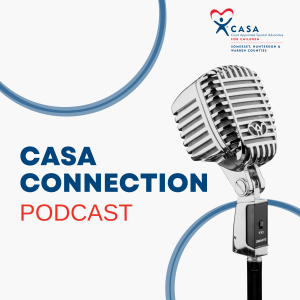Episodes

Wednesday Jul 09, 2025
Wednesday Jul 09, 2025
On this episode, Tracey and Jeff dove into the critical importance of resource parents within the world of foster care. These individuals, mainly family members, are some of the forgotten individuals at times within the system. Why are resource parents so important? How can they help provide for youth living in foster care? These are some of the questions we answered within this episode.

Wednesday Jun 25, 2025
Wednesday Jun 25, 2025
On this episode, Tracey and Jeff dove into the importance of help children and families via concrete resources. They spoke about CASA SHaW's "Big Ideas" plan and how we must continue to provide children living in foster care with better and enhanced resources in a very uncertain world.

Thursday Jun 12, 2025
Thursday Jun 12, 2025
This week, Tracey and Jeff talked about men's mental health as we recognize Men's Mental Health Awareness Month here in June. Jeff shares some of his story growing up, and inevitably focusing on himself and his mental health, healing from the trauma he endured as a young boy. The overriding theme of this episode, talking to someone helps to heal.

Tuesday May 27, 2025
Tuesday May 27, 2025
This episode features former New Jersey Superior Court Judge Thomas Dilts who pulls back the judicial curtain within the realm of foster care. After having spent much of his career as a family court judge, he came to understand how valuable CASA and CASA volunteers were to children living in foster care within our communities. We discussed his time as judge, what CASA has meant to him, and how he continues advocating for children in our region.

Wednesday May 14, 2025
Wednesday May 14, 2025
In this episode, Tracey and Jeff talk about the very real condition of burnout and how we, in the social work profession, need to institute boundaries from time to time. The mental health of our CASA volunteers, staff, Board of Trustees, and every stakeholder is important. We need to recognize what burnout might look like, and how to put up those boundaries when needed.

Wednesday Apr 30, 2025
Wednesday Apr 30, 2025
We spoke to our friends at CASA of New Jersey about the CASA Network Impact Initiative they have undertaken with the 12 CASA programs throughout the state. What is the goal of this initiative? How is being implemented? Inevitably, how will this help our CASA programs better serve children who are living in foster care? A great discussion about the progress our CASA programs are making.

Wednesday Apr 09, 2025
Wednesday Apr 09, 2025
On this episode, Jeff is joined by CASA SHaW Case Supervisor Lynn Kinkel as they discuss CASA's 20-year anniversary. Lynn was recently recognized at CASA SHaW's 20th Anniversary Gala as one of foundational pieces of our CASA program over the past two decades. Lynn discussed her many experiences, how she thinks we - as a society - can be better for children, and what our CASA nonprofit has meant to our region. It was a great discussion!

Thursday Mar 27, 2025
Thursday Mar 27, 2025
Within this episode, Tracey and Jeff discussed healing-centered practices that are valuable for adults. We all want to interrupt children’s negative behaviors, and one of the best methods to do this is to promote healing-centered practices. The strategies to do this are: self-care, co-regulation, and touch points. We hope this episode is valuable to you and those in your network.

Wednesday Mar 12, 2025
Wednesday Mar 12, 2025
In this episode, Tracey and Jeff discussed the concerns and reality of about future CASA funding as there is much uncertainty coming from our federal government about how new policies may impact nonprofits and essential services to children and families in our community. Will our CASA nonprofit (and others throughout the state and country) be able to continue serving children in foster care appropriately in the future?

Wednesday Feb 26, 2025
Wednesday Feb 26, 2025
On this episode, Jeff sat down and spoke to CASA SHaW's intern, Matthew Wickman, about his internship as a social work major, and how he dove into his work here at CASA. They spoke about how his internship provided him real world experience, the knowledge he has gained about CASA and the foster care system, as well as how he has grown both academically and personally. Plus much more great discussion points on this episode.




